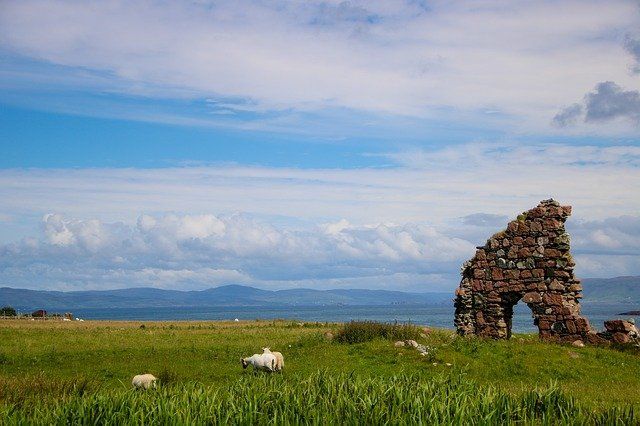
After six years of slavery in Ireland Patrick, now 22, had a dream. He heard a voice telling him to return to Britain and informing him that a ship was ready. So he ran away.
He walked for 200 miles to a port, probably on the south coast of Ireland, where he found a ship ready to depart. After a three-day voyage they reached land. This was probably France.
Patrick stayed here for several years before finally returning to Britain and Clydeside.
Grip of idolatry
Back at home, Patrick became convinced that God was calling him to return to Ireland as a missionary pastor. He therefore trained for the ministry, and in his early 30s was back in Ireland, charged to evangelise a people still in the grip of idolatry.
He spent the rest of his life there, labouring amid many persecutions. Patrick’s writings show that he was truly and humbly thrilled to have been used for the conversion of a large number of people.
One writer has said that Patrick came back to Ireland ‘to convert the inhabitants to Christianity – at that time the only Christian religion was Catholicism’. This is completely untrue.
By Patrick’s time Roman Catholicism had barely begun to develop, even on the continent. It was certainly quite unknown in the British Isles, whose churches had grown up over the years without much contact with continental developments.

A longer-term fruit of Patrick’s work in Ireland was a fresh influx of the gospel into Britain. In 563 a 42-year-old Irish pastor called Columba, accompanied by twelve colleagues, landed on the small island of Iona at the western tip of the Isle of Mull.
Columba was related to the Donegal royal family. He trained for the Christian ministry in Ireland under a pastor named Finnian. The circumstances of his coming to Scotland are unclear.
Banished or called?
There is a story which runs as follows. Finnian had a copy of the Book of Psalms in Latin as translated by Jerome early in the previous century. Some people claim that he acquired this during a visit to Rome.
More probably he had copied it legitimately in the library at Whithorn during a stint of teaching there. Columba is said to have made a copy without first asking Finnian’s permission.
When Finnian found out he was angry. He demanded that Columba hand the copy over to him, but Columba refused. Finnian took the matter to Diarmid, King of Ulster.
He judged against Columba, saying that the copy was the rightful property of the owner of the original.
Columba’s royal connection enabled him to raise an army, and he declared war on Diarmid’s clan. In the ensuing battle 3000 men lost their lives. Some historians claim that Columba was then banished from Ireland as a punishment, others that remorse drove him into voluntary exile.
On the other hand it is sometimes said simply that Columba sensed that God was calling him to missionary work in Scotland and went in obedience to the call.
This seems to be what the oldest sources say, and the copyright story may be a later invention, though it is difficult to imagine why anyone should want to invent such a story.

The Medieval Catholic Church might have wanted to discredit Columba in order to bolster its own prestige over against the independent British Church.
An alternative possibility is that those who had first known Columba glossed over the unfortunate incident. It is impossible to know for certain what the facts are.
Italian missionary
Whatever the circumstances, Columba arrived on Iona in A.D. 563. Southern Scotland was already Christianised well before this time. However, the gospel had not yet penetrated the northern Highlands, and it was here, in the realm of King Bride with its capital in Inverness, that Columba spent the next 30 years in itinerant evangelistic work.
He returned to Iona periodically for rest and reinvigoration. Bede tells us that both his preaching and his example proved highly influential amongst the northern Picts.
It seems that Columba also had some gospel success amongst the Germanic invaders – there were some Saxons at Iona during his lifetime. He died on 9 June 597 at the age of 76.
The year 597 is a notorious date in the history of British Christianity. That spring, just a couple of months before Columba’s death, an Italian missionary, Augustine, commissioned by Gregory, the Bishop of Rome, landed in Kent. (This Augustine must be distinguished from his namesake, the great fifth-century North African theologian.)
Seeds of Romanism
In the 200 years since the fall of Rome, British and Irish Christianity had been isolated from developments in mainland Europe. Ireland, indeed, had never been part of the Roman Empire.
The churches in these islands had developed quite independently. They remained locally based, while the West European church became increasingly centralised. On the continent the seeds of Romanism were beginning to germinate.
An episcopal structure had developed, where bishops ruled large dioceses. The claims of the Bishop of Rome to universal supremacy were beginning to be pressed.

To be fair, the decision to send Augustine to Britain was, in part, well motivated. The story is told of a visit which Gregory had made to the Roman slave-market while he was still a young monk. He saw some English youths. Their appearance impressed him.
Saddened to learn that their native land was still pagan, he obtained leave of Benedict, the Bishop of Rome at the time, to go to England as a missionary.
But shortly after setting out he was recalled to Rome where, Benedict had concluded, his ministry would be better used.
But Gregory’s purpose was not to be frustrated. In 590 he became Bishop of Rome. This enabled him to renew his desire to see England converted. No longer free to undertake the mission himself, he commissioned Augustine and a team of forty colleagues to bring the faith to the Anglo-Saxons.
Dangerous journey
Augustine and his companions left Rome early in A.D. 596. Having reached the south of France they became faint-hearted. Augustine left his colleagues there and returned to Rome to ask Gregory’s permission to abandon the enterprise.
Unmoved, though not unsympathetic, Gregory sent him back to his colleagues with a brief letter of encouragement.
‘Since it had been better’, wrote Gregory, ‘not to have begun what is good than to return back from it when begun, you must, most beloved sons, fulfil the good work which, with the help of the Lord, you have begun.
‘Let then neither the toil of the journey, nor the tongues of evil-speaking men deter you; but with all instancy and all fervour go on with what, under God’s guidance, you have commenced…
‘May Almighty God protect you with his grace, and grant me to see the fruit of your labour in the eternal country… God keep you safe, most beloved sons.’
Augustine left Rome for the second time, bearing this letter, in July 596.
Proverbial barbarity
Gregory’s words provide a clue as to why the missionaries almost aborted their endeavour. The trek across Europe was taking its toll, and conversations en route appear to have had a deterrent effect.
Gregory’s prayer for their protection and safety suggests that people had warned them of the potential dangers of their mission. Perhaps the violent barbarity of the pagan English was proverbial across the channel.
It is sometimes suggested that Gregory’s true motive for the English mission was the strengthening of the western Empire. It is hard to assess this claim. Reading Gregory’s own words we get no hint of it.
Of course it could be argued that his writings conceal his real purpose. Certainly, as the mission to England progressed, it developed into a power struggle between Rome and the indigenous British Church.
The supremacy of Rome became a decisive factor in the thinking of Augustine. However, it seems improbable that this was already a conscious intention as the ambassadors set out.
Mission deflected
True, Gregory was aware of the existence of the British Church, now largely confined to the northern and western fringes of the island. He reprimands its pastors for neglecting to kindle in the Angles the desire for conversion.
He identifies this failure as his reason for commissioning Augustine. His concern was that the souls of the English would ‘perish in eternal damnation’ unless he took action. To that extent, he was well motivated, even though it is true that the mission later veered off in other directions.
On arriving in Kent, Augustine requested a meeting with its king, Ethelbert. He agreed, on condition that it take place in the open air.
Bede explains that Ethelbert superstitiously believed that if the missionaries practised magic, the spirits could not deceive him provided they were not inside a building.
Ethelbert was not immediately persuaded by the message of the newcomers, though he allowed them to preach to his people, and gave them a house in Canterbury to use as a base.









